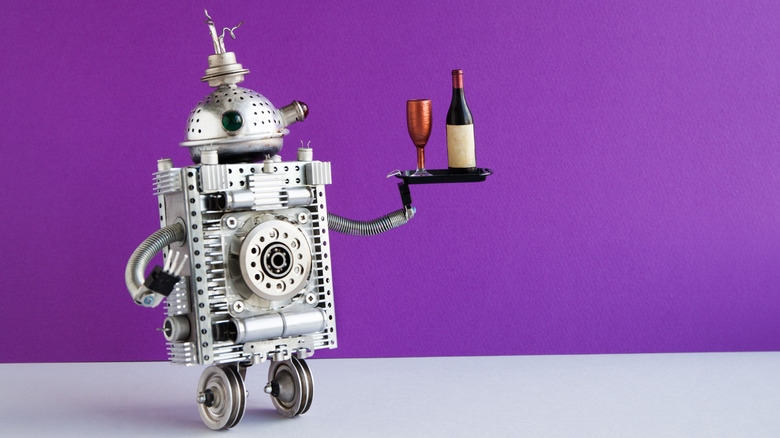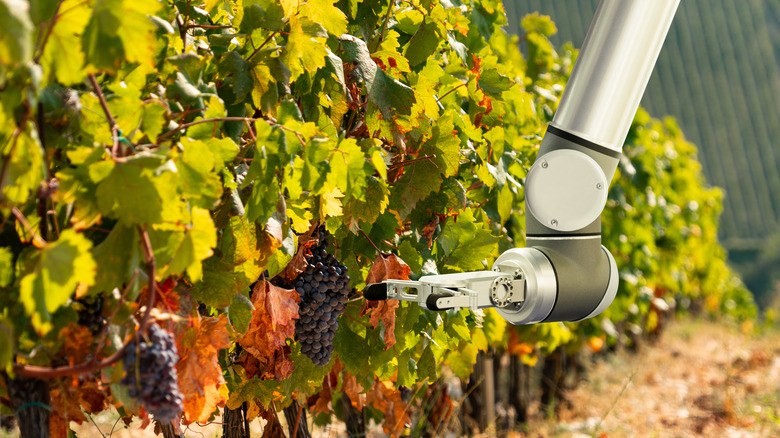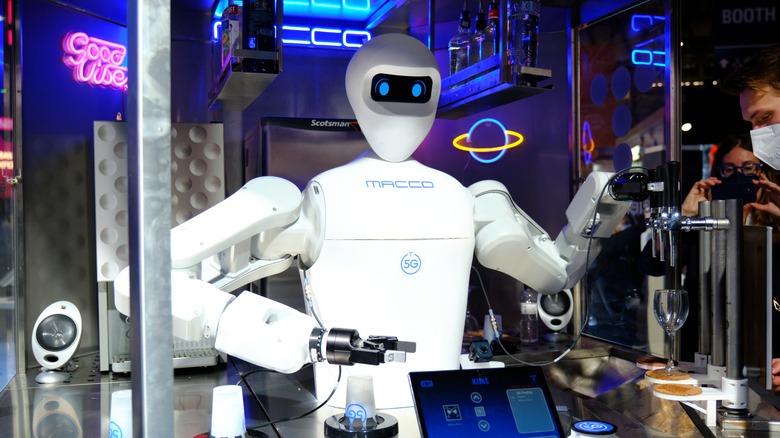That Wine Review You're Consulting Could Be Written By A Robot
New Artificial Intelligence technology might give sommeliers something to wine about. Now, your friendly neighborhood wine critic isn't the only one who'll be able to tell you which wine to pair with dinner. A group of researchers recently developed an AI algorithm capable of reviewing different wines: introducing, the robot sommelier.
Perhaps surprisingly, the wine critic business is a smooth fit for AI technology. Keith Carlson, co-developer of the algorithm, explains that most wine reviews utilize a predictable, fairly consistent, and somewhat limited bank of vocabulary terms, via Scientific American. AIs deal well with specifics, he says, which suits the classic wine descriptors such as "floral" or "dry," and factual variables like growing region and production year.
To create the database and learn the sommelier's writing style, Carlson and his team fed their AI program roughly 125,000 reviews from Wine Enthusiast magazine, reports Scientific American. The technology is still in development, but the initial test results are impressive. In a side-by-side comparison of AI-generated wine reviews versus critiques written by human reviewers, most human test subjects couldn't tell which was which. The robot sommelier, however, isn't totally operational without some human contribution; AI cannot taste, and therefore can't generate a review for a wine unless a person has sampled it and written a review of their own — or at least contributed enough data for the AI to get a general idea of the product.
Here come the wine robots
As funny as it sounds, wine robots are nothing new. On the agricultural side of the wine process, robots have revolutionized the modern farming industry. According to DJI Enterprise, agriculture drones weed, fertilize, increase yield, and lower the cost of operation for crops across the globe –- vineyards included. In Toulouse, France in 2019, Naïo Technologies created a robot called Ted, which patrols the world-famous Rémy Martin vineyard collecting data. Ted prunes vines and pulls weeds, which makes chemical weed killers totally unnecessary, a huge stride in the realm of sustainable agriculture, reports Wine Enthusiast. AI robots are becoming particularly useful in the unpredictable harvest patterns of recent years, it says, as climate change instigates drought and rapidly changing temperatures, which can be hard on crops. A robot's-eye-view notices these variables and heads off the loss before it can happen.
In January 2021, via Business Insider, Samsung debuted a robot assistant with such a steady and precise mechanical arm that it can pour your wine for you. The day might not be too far off when AI technology can harvest the grapes and then hand you the tulip glass.
Step aside, sommeliers
AI technology isn't just for the physically laborious arenas of the wine world, either. In 2005, researchers at NEC System Technologies and Mie University developed a "winebot" capable of identifying and distinguishing between specific brands of wine and cheese, via NBC.
In 2018, Clara Wine gained popularity as the first AI wine subscription service. To get started, subscribers take a quiz on the Clara Wine website 2018, which categorizes each user into one of 12 different groups based on their aroma, flavor, and body preferences, via Got To Be Gourmet. The process was similar to Spotify's personalized "Made For You" playlists, curated based on data collected from your regular listening habits and music preferences: an algorithmic sommelier.
In 2014, Scientists in Denmark led by Ph.D. student Joana Guerreiro developed an "artificial tongue" with almost human taste capabilities, reports Vine Pair. The tongue uses a nanosensor to analyze the molecular makeup of an individual's mouth, TechCrunch explains. It then processes this data to gauge how tannins will hit their unique tastebuds, and how their palette is likely to respond to the astringency of a given wine. Not only is this technology a scientifically-backed wine matchmaker, but its objectivity could also even be considered preferable to a human sommelier. AI will suggest whether you might prefer a Cab or a Malbec without telling you which one it prefers first.


